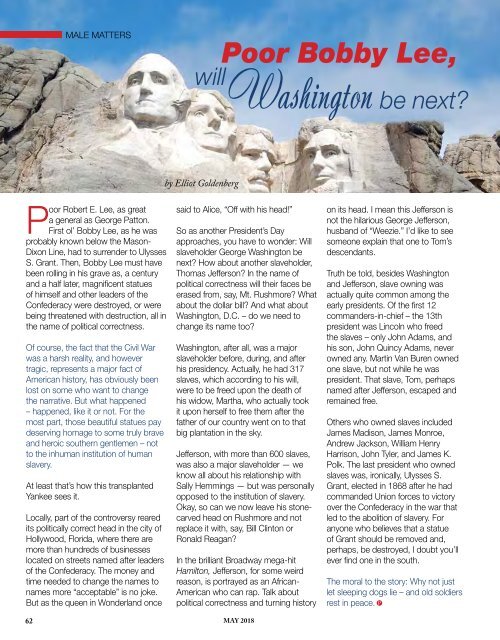May 2018
You also want an ePaper? Increase the reach of your titles
YUMPU automatically turns print PDFs into web optimized ePapers that Google loves.
MALE MATTERS<br />
will<br />
Poor Bobby Lee,<br />
Washington<br />
be next?<br />
by Elliot Goldenberg<br />
Poor Robert E. Lee, as great<br />
a general as George Patton.<br />
First ol’ Bobby Lee, as he was<br />
probably known below the Mason-<br />
Dixon Line, had to surrender to Ulysses<br />
S. Grant. Then, Bobby Lee must have<br />
been rolling in his grave as, a century<br />
and a half later, magnificent statues<br />
of himself and other leaders of the<br />
Confederacy were destroyed, or were<br />
being threatened with destruction, all in<br />
the name of political correctness.<br />
Of course, the fact that the Civil War<br />
was a harsh reality, and however<br />
by tragic, Palmer represents Peters a major fact of<br />
American history, has obviously been<br />
lost on some who want to change<br />
the narrative. But what happened<br />
– happened, like it or not. For the<br />
most part, those beautiful statues pay<br />
deserving homage to some truly brave<br />
and heroic southern gentlemen – not<br />
to the inhuman institution of human<br />
slavery.<br />
At least that’s how this transplanted<br />
Yankee sees it.<br />
Locally, part of the controversy reared<br />
its politically correct head in the city of<br />
Hollywood, Florida, where there are<br />
more than hundreds of businesses<br />
located on streets named after leaders<br />
of the Confederacy. The money and<br />
time needed to change the names to<br />
names more “acceptable” is no joke.<br />
But as the queen in Wonderland once<br />
62<br />
said to Alice, “Off with his head!”<br />
So as another President’s Day<br />
approaches, you have to wonder: Will<br />
slaveholder George Washington be<br />
next? How about another slaveholder,<br />
Thomas Jefferson? In the name of<br />
political correctness will their faces be<br />
erased from, say, Mt. Rushmore? What<br />
about the dollar bill? And what about<br />
Washington, D.C. – do we need to<br />
change its name too?<br />
Washington, after all, was a major<br />
slaveholder before, during, and after<br />
his presidency. Actually, he had 317<br />
slaves, which according to his will,<br />
were to be freed upon the death of<br />
his widow, Martha, who actually took<br />
it upon herself to free them after the<br />
father of our country went on to that<br />
big plantation in the sky.<br />
Jefferson, with more than 600 slaves,<br />
was also a major slaveholder — we<br />
know all about his relationship with<br />
Sally Hemmings — but was personally<br />
opposed to the institution of slavery.<br />
Okay, so can we now leave his stonecarved<br />
head on Rushmore and not<br />
replace it with, say, Bill Clinton or<br />
Ronald Reagan?<br />
In the brilliant Broadway mega-hit<br />
Hamilton, Jefferson, for some weird<br />
reason, is portrayed as an African-<br />
American who can rap. Talk about<br />
political correctness and turning history<br />
MAY <strong>2018</strong><br />
on its head. I mean this Jefferson is<br />
not the hilarious George Jefferson,<br />
husband of “Weezie.” I’d like to see<br />
someone explain that one to Tom’s<br />
descendants.<br />
Truth be told, besides Washington<br />
and Jefferson, slave owning was<br />
actually quite common among the<br />
early presidents. Of the first 12<br />
commanders-in-chief – the 13th<br />
president was Lincoln who freed<br />
the slaves – only John Adams, and<br />
his son, John Quincy Adams, never<br />
owned any. Martin Van Buren owned<br />
one slave, but not while he was<br />
president. That slave, Tom, perhaps<br />
named after Jefferson, escaped and<br />
remained free.<br />
Others who owned slaves included<br />
James Madison, James Monroe,<br />
Andrew Jackson, William Henry<br />
Harrison, John Tyler, and James K.<br />
Polk. The last president who owned<br />
slaves was, ironically, Ulysses S.<br />
Grant, elected in 1868 after he had<br />
commanded Union forces to victory<br />
over the Confederacy in the war that<br />
led to the abolition of slavery. For<br />
anyone who believes that a statue<br />
of Grant should be removed and,<br />
perhaps, be destroyed, I doubt you’ll<br />
ever find one in the south.<br />
The moral to the story: Why not just<br />
let sleeping dogs lie – and old soldiers<br />
rest in peace. P

















